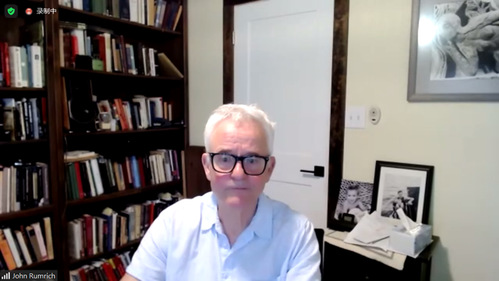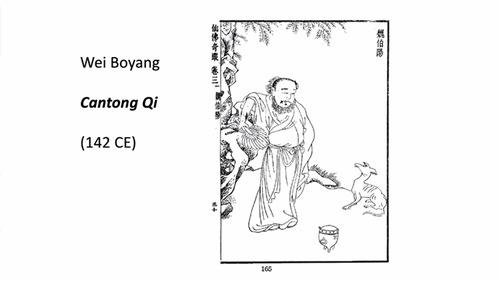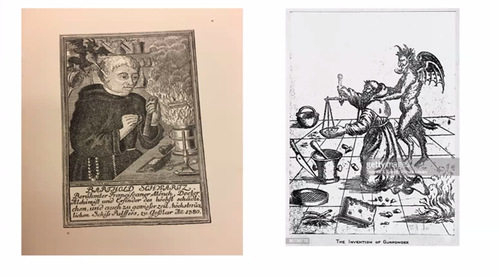The 38th lecture of the Center for Medieval and Renaissance Studies (CMRS) at School of International Studies, Zhejiang University, entitled “Milton’s Epic Paradise Lost and the Gunpowder Plot”, was delivered by Prof. John P. Rumrich from the University of Texas at Austin online on the evening of June 16, 2023. The lecture lasted for more than two hours, and attracted over 80 students and teachers from the institutions of higher learning across the world. As a prelude to “Literature Matters: The 2nd International Symposium on Foreign Literature and Comparative Literature” co-hosted by CMRS and School of English Studies (SES) of Shanghai International Studies University, the lecture was moderated by Prof. HAO Tianhu, Qiushi Distinguished Scholar and Director of CMRS.
As a globally renowned scholar of Milton and Renaissance literature, Prof. Rumrich once taught Milton and 17th-century British literature at Peking University in the mid-1980s and has visited China several times since then for academic activities. Currently a Celanese Professor of British Literature at the University of Texas at Austin and an international consultant for the CMRS, Zhejiang University, he has been president of the Milton Society of America (MSA) and recipient of its various awards including “Honored Scholar” (i.e., Lifetime Achievement Award). His books include Matter of Glory (1987), Milton Unbound (1996, 2006), Milton and Heresy (co-ed., 1998, 2008), Paradise Lost (co-ed., 2008), Immortality and the Body in the Age of Milton (co-ed., 2018), three of which were published by Cambridge University Press.

Prof. Rumrich in the lecture
Prof. Rumrich began his lecture with a summary of the history of “Gunpowder” worldwide. Starting from the birth of gunpowder in China, Prof. Rumrich analyzed the records and attitudes of Taoists and alchemists about it at the early stage, pointing out that gunpowder was initially regarded as a secret formula for prolonging life and enhancing harmony before evolving into what Shakespeare described as “a prop that seeks to create death and destruction” centuries later. Then, using Roger Bacon’s Opus Majus as an introduction, he examined in detail, from the perspectives of geography, architecture and military organization, how European gunpowder, in its dissemination, came to be different from the Chinese gunpowder of the same period, with a focus on heightening the power and explosive intensity of artillery.

Figure 1
On this basis, Prof. Rumrich cited the images of gunpowder in literature, such as works of Petrarch, Ariosto, Milton, and Swift, saying that Christianity regarded gunpowder as a creation of the devil for its destructive force. In a painting of Barthold Schwartz developing gunpowder, a demon, hovering at the upper left corner of the image, was whispering in Schwartz’s ear through a thin tube in order to infiltrate this evil invention into his mind.

Figure 2
Prof. Rumrich believed that gunpowder was cleverly combined with the ear, a supernatural channel, in Volume IV of Paradise Lost,in which Satan, in the form of a toad, was introducing evil suggestions into the ear of Eve when Ithuriel, a guardian angel, poked him with a spear. Milton repeatedly used touch, a word that has been used to describe the denotation of gunpowder in the War in Heaven. Satan then returned to his true form, “for no falsehood can endure Touch of Celestial temper, but returns Of force to its own likeness” (Paradise Lost, 4.810-11). Furthermore, the process of Satan’s returning to its own likeness was likened to the moment when a powder keg exploded, “Against a rumord Warr, the Smuttie graine/With sudden blaze diffus’d, inflames the Aire” (817-18).
Then, Prof. Rumrich examined all the gunpowder-related descriptions in Paradise Lost, including the birth of “Sin”, Satan’s invention of the cannon during the War in Heaven, Satan’s thoughts which was described as the cannon after his defeat, and most importantly, the explosions encountered by Satan as he traversed through chaos. In his analysis, Prof. Rumrich asserted that gunpowder was tightly intertwined with “Fallenness” in Paradise Lost, serving as an indispensable means through which God bestows “redemption”.
Prof. HAO Tianhu highly praised Prof. Rumrich’s effective approach of combining philology and cross-cultural studies, and believed that his criticism rendered great inspirations. In the Q&A section, Prof. Rumrich gave professional answers to questions, such as “whether knowledge is a form of manipulation”, “what is the key to the Gates of Hell in Paradise Lost”, and “how chaos contains these two seemingly contradictory forces of destruction and generation”.

Prof. Rumrich and Prof. HAO Tianhu
Prof. Rumrich presented a very insightful perspective in his lecture, and the most valuable lesson for the audience was how to trace back seemingly conventional words in the text, such as “engine”, “touch”, and “blast”, to their historical contexts to explore the meanings lost in the modern age. Although the lecture focused on Milton’s Paradise Lost, Prof. Rumrich started from ancient Chinese Taoist texts in the 3rd century AD and ultimately delved into the early modern Christian epic of the 17th -century Britain. While leading the audience through the evolution of gunpowder, he also demonstrated his rigorous scholarly attitude and research methods, offering valuable literary study experience for all.
Text: LIN Weijian
Center for Medieval and Renaissance Studies, School of International Studies
Translated by ZHANG Xiaoran and CHEN Yuqing, Proofread by XU Xueying



